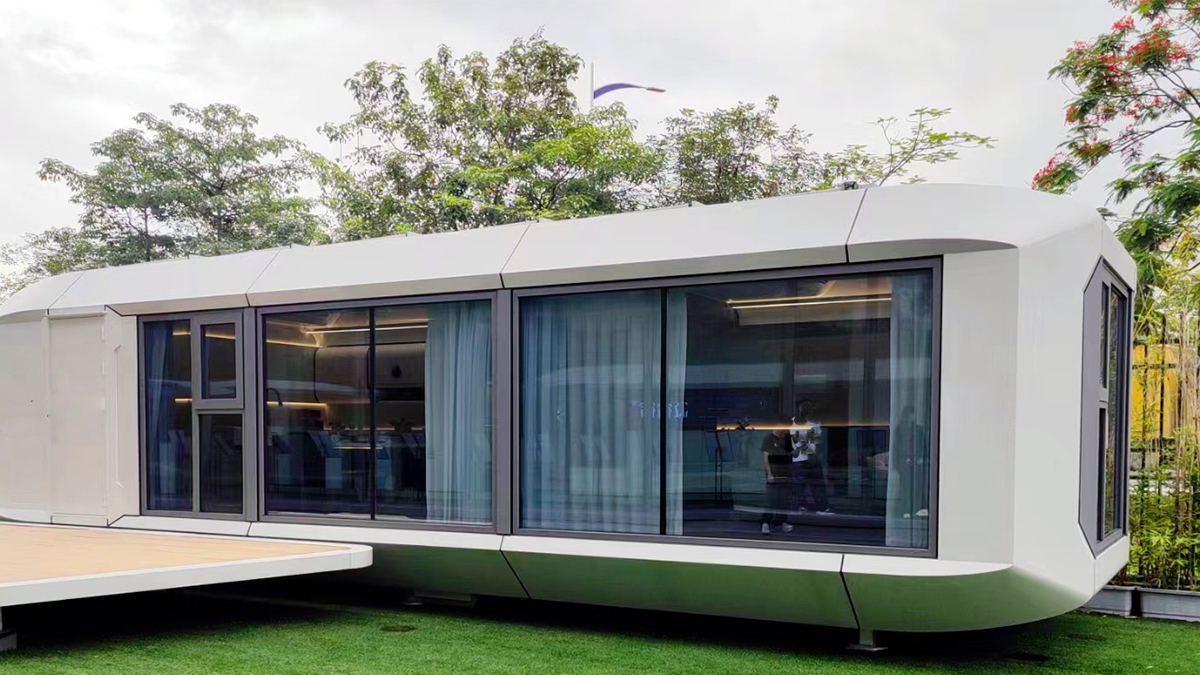
29 Aug What Is the Price Range of Capsule Houses in the USA
Table of Contents
Capsule house prices in the USA go from $3,000 to over $200,000. This is based on recent market data. Many things affect these prices, like size, materials, and technology features. Prices can change because of location, customization, and local rules. Some people pick sustainable materials or smart home options. These choices can make the house worth more. High real estate costs in cities and labor rates matter too. Shipping and insurance also add extra costs.
Key Takeaways
Capsule house prices in the USA go from $3,000 to over $200,000. The price depends on size, materials, and features. Entry-level capsule houses give basic shelter. They cost between $150 and $35,000. Medium and luxury models have more space and smart features. These models cost more money. Size, quality of materials, and location change the total cost. Delivery and customization also affect the price. Buyers should plan for extra costs like land and permits. Utility hookups and setup fees can add to the price. This helps avoid budget surprises. Picking strong materials and prefabricated models saves money over time. Energy-saving features also help save money and make the home worth more.
Capsule House Price Range
Entry-Level Prices
Entry-level capsule houses are good for saving money. Prices can start at $150 for basic pods. Some units cost up to $35,000. RIGANG NEW MATERIAL LTD and Global Container Ltd sell waterproof pods and soundproof capsules. Boxi Technology LTD has two-bedroom capsules with kitchens. These cost $700 to $1,200 each. JACK MANUFACTURING LLC sells prefab container capsules for $5,999. Arora Traders and KR Trailer Mfy LLC offer luxury homes and modular capsule houses. Their prices are between $16,000 and $35,000. Mars Cabin Technology sells movable capsule hotels. These cost $290 to $589 per square meter.
Manufacturer | Model / Product Type | Entry-Level Price Range (USD) | Unit Type |
|---|---|---|---|
RIGANG NEW MATERIAL LTD | Basic pods, waterproof prefabricated | $150 – $180 | Unit |
Global Container Ltd | Modular double soundproof capsules | Starting at $2,200 | Set |
Boxi Technology LTD | 2-bedroom capsules with kitchen | $700 – $1,200 | Piece |
JACK MANUFACTURING LLC | Prefab container capsules | $5,999 | Unit |
Arora Traders | Luxury prefabricated homes | $16,000 – $25,000 | Unit |
KR Trailer Mfy LLC | 2-bedroom modular capsule houses | $16,000 – $35,000 | Set |
Mars Cabin Technology | Movable capsule hotel | $290 – $589 | m² |
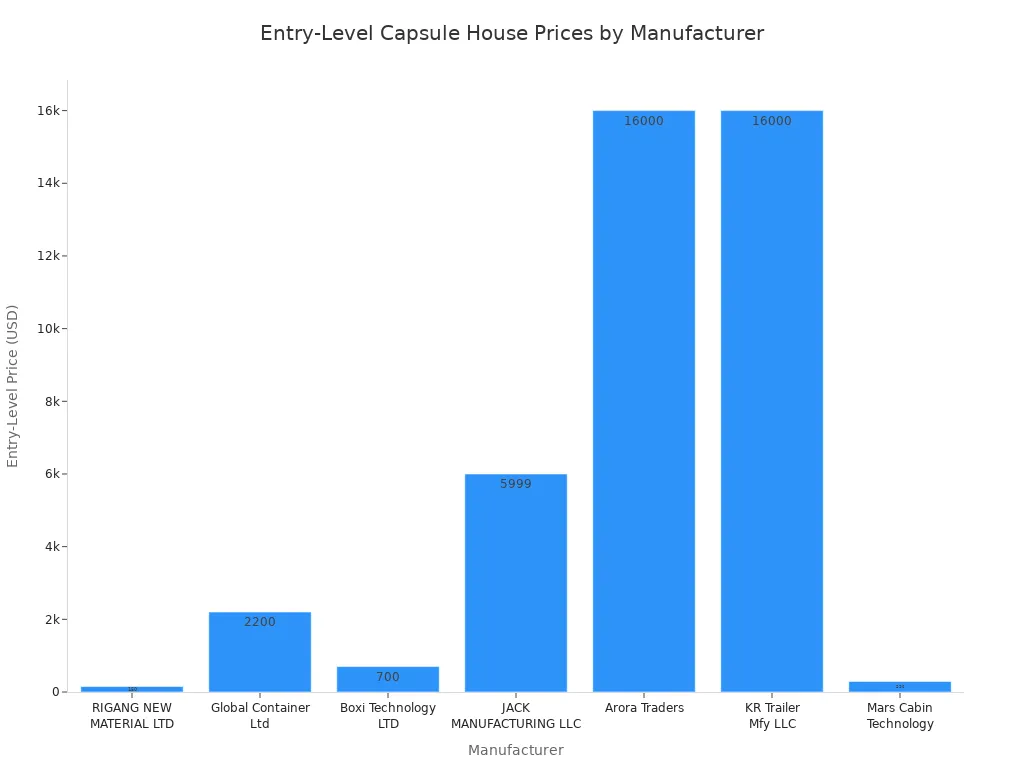
Entry-level capsule houses give basic shelter and simple features. Most have insulation, waterproofing, and plain inside finishes. People buy these for temporary homes, emergencies, or cheap living.
Medium and Standard Prices
Medium capsule houses have more space and comfort. Prices go from $30,000 to $100,000. The cost depends on size and custom options. Prefab models between 201 and 400 square feet cost $30,000 to $60,000. Custom capsule houses with special features can cost up to $100,000. The N50 model is 409 square feet. It costs $36,800 before shipping and setup.
Capsule House Type | Size Range (sq. ft.) | Price Range (USD) | Price per sq. ft. (USD) |
|---|---|---|---|
Medium Capsule House | 201 to 400 | $30,000 to $60,000 (Prefab) | $100 to $200 |
Custom Capsule House | Varies (often medium size) | $60,000 to $100,000 | $200 to $350 |
Medium capsule houses have more rooms, kitchens, and bathrooms. Some have balconies too. Better insulation, eco-friendly materials, and smart home systems make them nicer. The X70 Cabin has two rooms, a balcony, bathroom, big windows, strong steel frame, double-glazed windows, thick insulation, bamboo walls, and voice control. These features make the price higher but improve comfort.
Medium capsule houses are good for small families or people who want more features. Buyers get better insulation, smart tech, and save energy. Delivery and setup cost extra and change the total price.
Large and Luxury Prices
Large capsule houses have fancy features and last longer. Prices range from $80,000 to over $200,000. Space Capsule House G50 and L50 are about 28 to 38 square meters. They cost $25,329 to $38,001. Capsule Tiny House RT S71 and Prefab Tiny House M70 have similar prices. Round Pod Capsule Houses start at $15,000.
Model Name | Size (sqm) | Price (USD) |
|---|---|---|
Space Capsule House G50 | 28 | $25,329 |
Space Capsule House G70 | 38 | $31,393 |
Capsule House L50 | 28 | $25,329 |
Capsule House L70 | 38 | $29,379 |
Capsule Tiny House RT S71 | 28 | $38,001 |
Prefab Tiny House M70 | 38 | $29,250 |
Round Pod Capsule House | 28 | $15,000 |
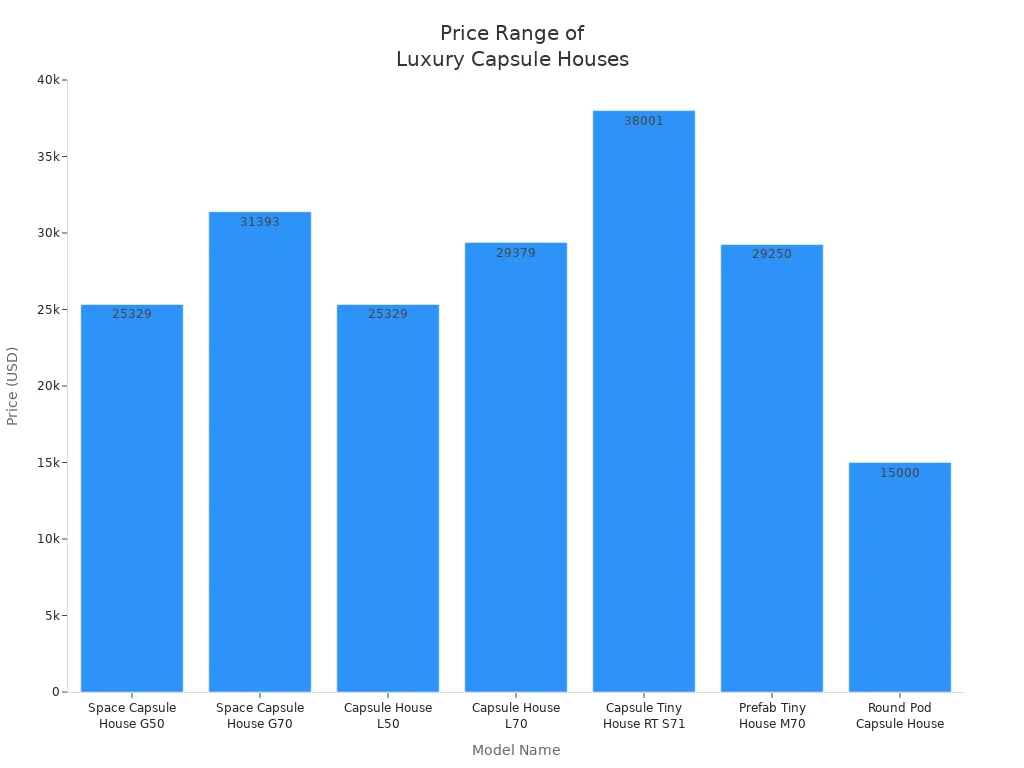
Luxury capsule houses use strong aluminum panels and thick glass. They have fireproof parts, advanced insulation, and soundproofing. These houses can handle bad weather and have anti-theft features. Owners can pick custom options. Buyers get help after buying and long warranties.
Large capsule houses are used by fancy hotels, resorts, and businesses. Owners get strong buildings, save energy, and enjoy special features. Capsule houses cost less to keep up and build faster than regular tiny homes.
Price Factors
Size and Layout
Size and layout matter a lot for price. Bigger capsule houses cost more than small ones. The Capsule Signature Tiny Home is between 201 and 400 square feet. The biggest one can cost up to $99,000. If the design has bedrooms, bathrooms, and kitchens, the price goes up. A basic studio capsule has one room and few extras. It costs $20,000 to $30,000. Capsules with more rooms cost $40,000 to $70,000. Luxury capsules with special designs and fancy materials cost over $100,000.
Capsule House Category | Size Range (sq ft) | Layout Complexity | Price Range (USD) |
|---|---|---|---|
Basic Studio Capsule | ~100 sq ft | One main room, minimal amenities | $20,000 – $30,000 |
Midrange Capsule | 200 – 300 sq ft | Separate rooms (bedroom, bath) | $40,000 – $70,000 |
High-End Luxury Capsule | 300 – 500+ sq ft | Custom designs, premium materials | $70,000 – $100,000+ |
Materials and Quality
The materials and how well the house is built change the price. Builders who use strong and green materials make the house worth more. Good building skills also help. Solar panels and eco insulation are good for saving energy. These features attract buyers who care about the planet. Capsule houses with high quality last longer and sell for more later. Bad materials or poor building make the price lower. They are harder to sell again. Buyers should pick strong and good materials for a smart buy.
Location and Delivery
Where you put the capsule house and how far it travels change the price:
Land costs and local rules make prices higher, especially in cities.
Delivery and setup cost more for places that are far away or hard to reach.
Buyers need to think about where the house will go and how it will get there when planning their budget.
Customization
Customization lets buyers make their capsule house fit their needs. Popular choices are modular design, easy moving, green features, and fast setup. Adding smart tech, special furniture, and energy-saving systems makes the price go up. This is true for mid and high-end models.
Customization Options / Features | Description / Popularity | Typical Cost Range (USD) |
|---|---|---|
Modular Design | Easily transportable and configurable | Included in base to mid-range |
Smart Technologies | Integration of smart home features | Adds to mid to high-end models |
Space-saving Furniture | Compact, multifunctional furniture | Adds to mid to high-end models |
Energy-efficient Systems | Systems to reduce energy consumption | Adds to mid to high-end models |
Sustainability | Eco-friendly materials and solar-powered systems | May increase cost |
Tip: If you pick fancy features and top materials, expect to pay more. These upgrades make the house nicer and help it last longer.
Capsule House Examples
 Manufacturer Quotes
Manufacturer Quotes
Manufacturers in the USA sell many capsule house models. Each model has its own price and features. The table below shows prices for popular models:
Capsule House Model | Original Price | Current Sale Price |
|---|---|---|
05 Space Capsule House | $23,500 | $21,000 |
Dome Sunroom Starry Sky Room | $13,500 | $13,000 |
E5 Space Capsule House | $28,500 | $27,000 |
E7 Space Capsule House | $30,000 | $27,000 |
J20 Space Capsule House | $25,500 | $24,000 |
Oval Sunroom Starry Sky Room | $16,500 | $15,000 |
Space Capsule House | $28,500 | $27,000 |
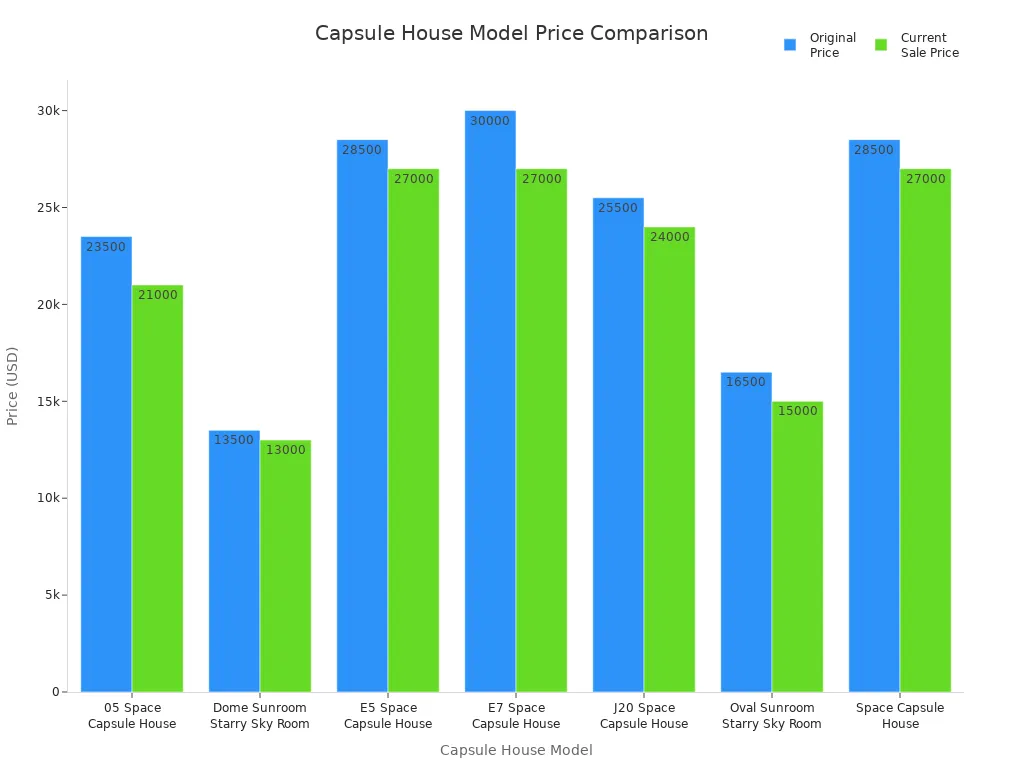
Manufacturers sometimes give discounts on some models. Buyers can find deals on regular and luxury capsule houses. Models like E5 and E7 have better insulation and smart features. The Dome Sunroom Starry Sky Room has big windows for a cool view.
Buyers should look at sale prices and features before buying. Some models come with installation or extra warranties.
Recent Purchases
Recent purchases show what buyers pay for capsule houses. The table below lists real prices for different brands and types:
Capsule House Type/Manufacturer | Price Range (USD) | Notes |
|---|---|---|
Entry-level Prefabricated Capsules | $20,000 – $50,000 | Small pods (~100-200 ft²), basic materials |
Standard Prefab Models | $30,000 – $60,000 | Typical 200-300 ft² modular units |
Custom & Luxury Capsules | $70,000 – $200,000+ | Smart tech, premium materials, larger sizes |
Ecocapsule Second Series “SPACE” | ~$55,000 | European model, shipped to USA |
Original Ecocapsule | ~$88,000 + ~$3,500 | Premium European model |
Amazon Capsule Tiny Home | $24,800 – $39,999 | Steel structure, includes installation |
Volferda Basic Models | $20,000 – $30,000 | Budget capsule houses |
Volferda Premium Custom Variants | $50,000+ | High-end finishes and features |
Etong Capsule Models (China) | $20,000 – $42,000 | Cost-effective prefab mobile homes |
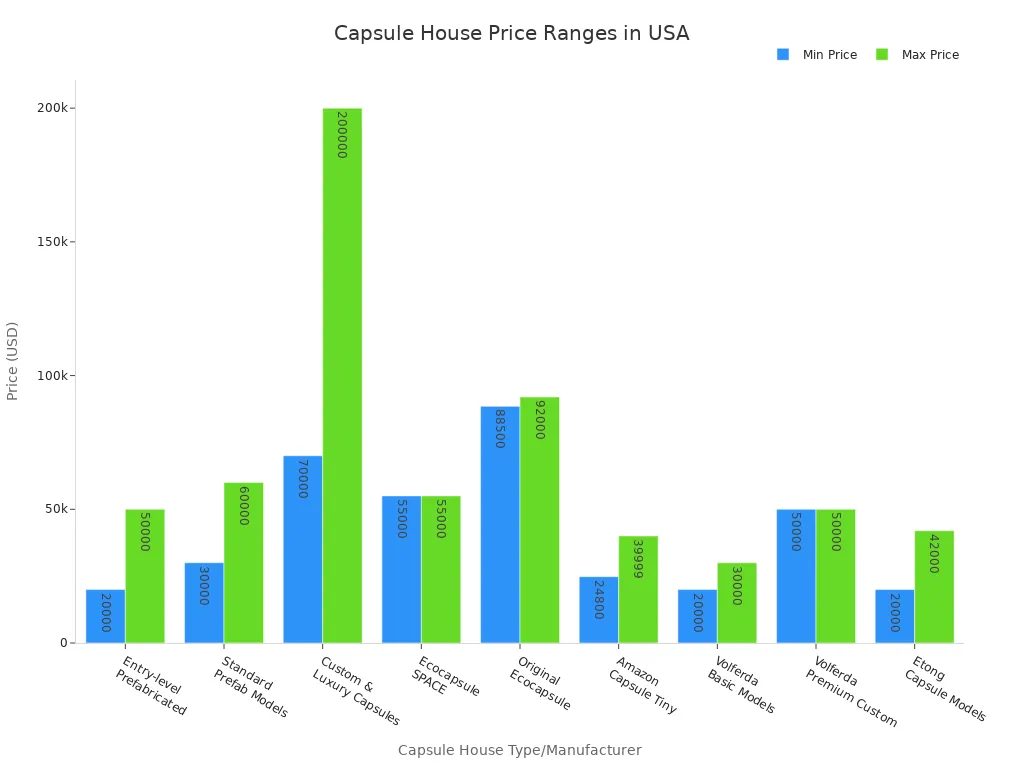
Many buyers pick cheaper modular houses for fast setup and lower cost. People who want fancy homes choose custom builds with smart tech and luxury finishes. Extra costs like shipping, site work, and permits can add $10,000 to $25,000.
The T50 model and similar units are popular because they balance price and features. Buyers should plan for extra costs besides the listed price.
Budgeting Tips
Additional Costs
Many buyers forget about extra costs when buying a new home. These costs can make the budget go up fast. The table below shows common extra costs buyers should know about:
Additional Cost Factor | Description and Estimated Cost Impact |
|---|---|
Land Cost | Land in cities costs about 30% more than in rural places |
Permitting Fees | Fees are $500 to $5,000 based on location and local rules |
Utility Hookups | Costs change, but rural areas can be $2,000 to $10,000 |
Transport & Setup | Fees are $1,500 to $7,000 depending on distance and setup needs |
Land costs more in cities, so location matters a lot. Permitting fees depend on local rules and can add thousands. Utility hookups like water and power cost more in faraway places. Transport and setup fees change, especially for long trips or hard-to-reach spots. Checking zoning laws early helps avoid delays and extra charges.
Tip: Buyers should add these costs to their budget from the beginning. Planning ahead stops surprises and keeps the project moving.
Value Strategies
Smart buyers use different ways to get the best value:
Pick prefabricated models for lower prices and quick delivery.
Choose strong materials like steel for long-lasting homes and eco benefits.
Think about off-grid systems like solar panels and rainwater collection to save on bills.
Use furniture that does more than one thing to save space and money.
Add secondhand or reused materials for a cool look and lower costs.
Remember hidden costs like legal fees, permits, moving, setup, and land work.
Skip fancy custom features and smart tech to keep starting costs low.
Make a careful budget for both first and future costs.
These ideas help buyers keep costs down and avoid going over budget. Good planning and smart choices lead to a happy purchase and long-term success.
Note: Buyers who pick strong, energy-saving, and practical designs often pay less for repairs and get more money if they sell later.
Prices for these homes start at $3,000 and can go over $200,000. Many things change the total price:
How well the house lasts in different weather
Layouts that save space and have good storage
Warranty and help after buying
The kind of prefab home and where it is
How well the house is built and if you want changes
If you want to buy one, you should:
Get the land and utilities ready before the house comes.
Ask local officials about permits you need.
Work with licensed builders for setup.
Planning ahead and learning more helps buyers avoid problems and make good choices.
FAQ
What is included in the base price of a capsule house?
The base price covers the main structure and basic insulation. It also includes standard finishes inside the house. Buyers usually pay more for delivery and setup. Permits and utility hookups cost extra too. Some companies give short warranties or simple appliances.
Can buyers finance a capsule house purchase?
Most people use personal loans or RV loans to buy. Some use home equity loans. A few manufacturers have payment plans for buyers. Banks might want proof you own land or have a solid foundation.
How long does it take to install a capsule house?
How long it takes depends on the model and site. Most capsule houses come ready to put together. Setup can be done in one day or a few weeks. If the land needs work, it might take longer.
Are capsule houses legal everywhere in the USA?
Local rules and building codes decide if you can have one. Some cities have very strict rules about these homes. Buyers should ask local officials before they buy.
Do capsule houses hold up in extreme weather?
Many capsule houses are made to handle wind, rain, and snow. High-end models use strong materials and better insulation. Buyers should ask about weather ratings for their area.
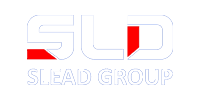



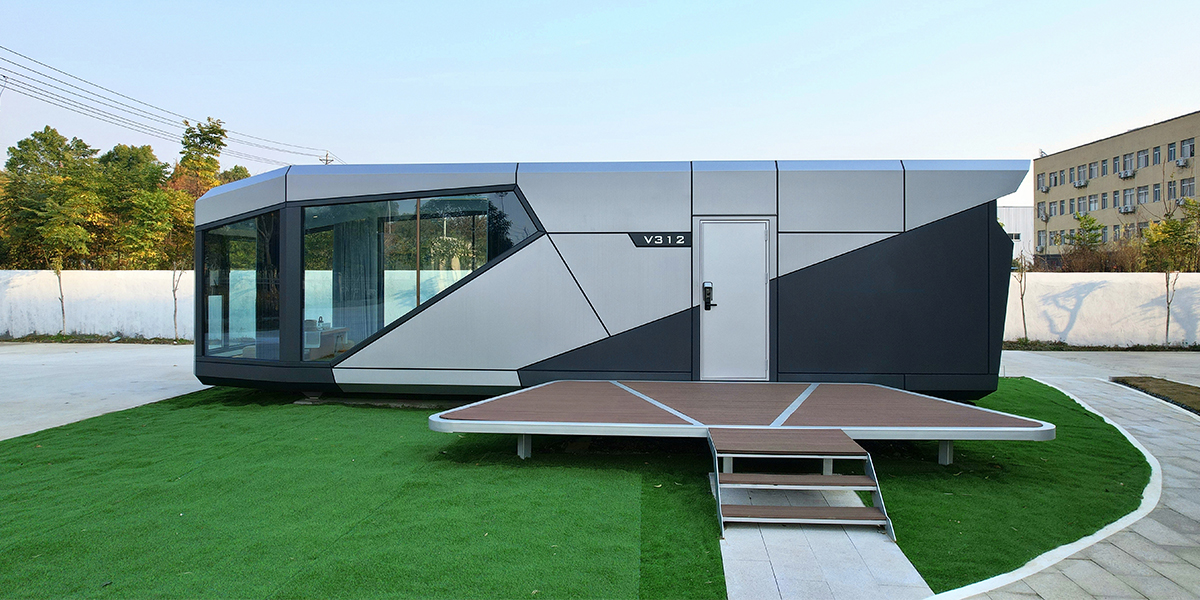 Manufacturer Quotes
Manufacturer Quotes